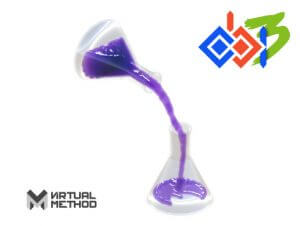Do I feel good today? That is the first question you should ask yourself when considering blood donation. If you are, generally, in good health, you can usually give blood. Healthy individuals who meet the following are encouraged to donate blood regularly:
- 16 and weigh at least 125 pounds (with signed parental permission),
- 17 and weigh at least 125 pounds or
- 18 and weigh at least 110 pounds
You can donate blood or platelets after receiving the Pfizer or Moderna COVID-19 vaccine with no waiting period.
- You can get Obi Fluid here:setup of a water emitter in Obi Fluid 5.0.
- Obi Fluid Obi Fluid is a fully-fledged 2D and 3D realtime fluid simulator for Unity. All physical properties or the fluid are adjustable: surface tension, stickiness, vorticity. Fluids can adhere to surfaces, form drops, split and merge.
OBI Fluid and transparent objects in URP. 3: 332: 0 Vote(s) - 0 out of 5 in Average;, 12:20 PM Last Post: josemendez: Help Obi fluid collision.
If your question isn’t answered below, or you need more detailed information BEFORE you donate, contact us at 405-419-1538.
Click on any question to view its answer (new changes in effect June 15, 2020).
Aspirin, acetaminophen and ibuprofen will not affect a whole blood, plasma or double red cell donation. Apheresis platelet donors, however, must not take aspirin or aspirin-containing products for 48 hours prior to donation. Aspirin reduces the potency and performance of your platelets. The more time between taking aspirin and donating blood, the better for the recipient.
It is recommended that you call the donor center before you come to donate to inquire about any medications you are taking. Most times, taking medications will not keep you from donating.
Yes, if the piercing facility is a physician’s office or licensed in one of these states: Arkansas, California, Colorado, Kansas, Louisiana, Mississippi, Missouri, New Mexico, Oklahoma, Texas.
If it is not licensed, you need to wait 3 months after getting a piercing to give. For more information please contact 1-877-340-8777.
You will be asked, in the past three years, have you been outside the U.S. and Canada?
However, travel restrictions are often changing. With questions about specific places you have visited, contact our customer service at 1-877-340-8777 or customerservice@obi.org.

Malaria Risk
- The CDC keep track of the locations with malaria risk for travelers from the U.S. Because the list of malaria-endemic areas is frequently updated, you are encouraged to visit the CDC website.
- Bring a list of your exact areas of travel with you when you come to donate blood. Often it’s not the entire country that is at risk for malaria, just certain areas of it. Knowing exactly where you have traveled is essential. The CDC website offers a list that keeps track of each country’s malaria risk.
- Know the date you returned to the United States. If you traveled to a malaria-endemic area and stayed for less than six months, there is a three-month deferral period for blood donation. The three months begin the day you return to the United States.

- If you’ve been been a resident of a high malaria risk country, however, you still remain deferred for 3 years.
Creutzfeldt-Jacob Disease (“Mad Cow Disease”) Risk
- Those who spent extended time in many European countries are now no longer deferred due to Mad Cow Disease risks. This change will likely allow many veterans and military personnel to donate blood.
- Individuals in the following groups will remain deferred because of European residency:
- Those who spent three months or more in the United Kingdom from 1980-1996*
- Those who spent five years or more in France or Ireland from 1980-2001
- This is the FDA recommendation due to symptoms of Creutzfeldt-Jacob Disease that may not appear until much later. The U.K. comprises England, Northern Ireland, Scotland, Wales, the Isle of Man, the Channel Islands, Gibraltar and the Falkland Islands.
If you’re not sure if travel has deferred you, please call 405-419-1538 or 877-340-8777.

Please call 1-800-375-7654 if you’ve recently donated blood then develop symptoms of illness after traveling.
Obi Cloth
Yes, if the tattoo facility is licensed in one of these states: Oklahoma, Texas, Arkansas, Colorado, New Mexico, Missouri, Kansas, California, Florida, Illinois, Louisiana, & Mississippi.
If it is not licensed, you need to wait 3 months after getting a tattoo to give. For more information please contact 1-877-340-8777.
Healthy individuals can donate whole blood every 56 days, plasma every 28 days and platelets every 7 days. Donors who give a double red blood cell donation are eligible again after 112 days.
If you are pregnant, you’ll need to wait until six weeks after you deliver before donating.
For breastfeeding moms, if you have a well-established milk supply, you can safely donate blood. Because donating blood removes fluid from the body and hydration levels affect milk supply, it is particularly important to eat a substantial meal before donating and to drink plenty of water after donation.
Most prescription medications taken on a daily basis will not keep you from donating. However, there are some medications that could cause you to be deferred. Click here for a partial list of common medications that will defer you or call 877-340-8777 for assistance. (Please use Internet Explorer or Firefox to access this list.)
If you are taking a penicillin, sulfa drug, another antibiotic or running a fever, you’ll need to wait for another time before donating. You must finish your course of antibiotics for fighting an infection, be symptom-free and be off of the antibiotics for one week before donating. Those who take antibiotics daily for conditions such as acne may be eligible to donate.
Medications for treatment of underactive or overactive thyroid do not disqualify you from donating.
Cancer survivors can donate blood one year after being cancer free. Those who have melanoma without metastases can donate after a three year waiting period. Those who have had hematologic blood cancers, such as leukemia, lymphoma or multiple myelomas remain ineligible to donate blood.
Precancerous conditions, such as certain skin lesions and HPV-associated precancers, do not disqualify you from donating blood.
Patients in the hospitals we serve need blood every day. Your donation is, literally, a matter of life and death to someone in need of it. Typically, there is a two-day period from the time of donation until that blood is available to a patient, so we must have blood available before an emergency or natural disaster occurs.

There is no waiting period to donate after receiving a flu shot.
Below are some rules for common vaccines and injections. With many, you will not be deferred from donating.
- You can donate blood or platelets after receiving the Pfizer or Moderna COVID-19 vaccine with no waiting period.
- Currently, you cannot donate convalescent plasma after receiving a COVID vaccine but conversations are ongoing and that could change.
- If you received an adenovirus vector vaccines (Oxford/AstraZeneca, etc), you can donate all blood products (except convalescent plasma) after a two-week deferral. If you received a monoclonal antibodies (Regeneron or Eli Lilly), you are deferred for 12 months and not eligible to donate convalescent plasma.
You are eligible to donate after two weeks for most (non-cardiac) surgeries as long as you have been released from medical care and are well recovered.
High Blood Pressure
As long as your blood pressure is 180/100 or below at the time of donation and you are feeling well, you can donate. Medications for high blood pressure do not disqualify you from donating.
High Cholesterol
High cholesterol levels do not disqualify you from donating. You can also donate if take medication to control your cholesterol.
Oklahoma Blood Institute screens for both of these and notifies donors of their results.
Both type 1 and type 2 diabetics are eligible to donate as long as blood sugar levels are stable. Taking insulin or oral medications for diabetes does not disqualify you from donating.
Anyone who is healthy and older than age 16 can give blood.
16-year-olds must weigh at least 125 pounds and provide signed parental permission to donate blood; 17-year-olds must weigh at least 125 pounds; 18+ year-olds must weigh at least 110 pounds.
There is no upper age limit on blood donation. Senior citizens contribute greatly to the community’s life-saving blood supply.
You are still eligible to donate if you have herpes, venereal warts, chlamydia, or trichomoniasis. You are eligible to donate 3 months after completing treatment for syphilis or gonorrhea.
Obi Fluid Toothpaste
HIV, AIDS, and Hepatitis B & C prevent you from donating. If you’ve had a positive test, please call 1-877-340-8777 for further information.
Your hemoglobin levels may vary over time. Having a slightly low hemoglobin on one occasion does not mean you are chronically anemic and can never donate blood. Your hemoglobin level will be checked prior to donating blood. If your level is normal on the day of donation, you are eligible to give blood.
Blood donation can temporarily affect endurance performance. Full recovery of physical performance occurs within 14 days of a standard blood donation. If you are a competitive athlete, it is best to donate during your off-season.
Obitalk Forums
Obi Fluid Vr
You now only have to wait three months following your blood transfusion to donate blood or blood products.
